Shennongjia Natural Reserve
( chinadaily.com.cn )
|
|||||||||
Shennongjia Natural Reserve is a very famous place in China for at least two reasons. It's a treasure trove of wildlife renowned since Emperor Shennong, who visited the mountains searching for herbs and using a ladder to collect some of the most precious ones from the rocks. Shennong is best known as the writer of one of the first Materia Medica. Hence the name Shennongjia, meaning the "Ladder of Shennong".
But even though an addicted botanist, this was not the only reason the place was high on his list. In fact, Shennongjia is also famous for being home to the "Yeren" or wild men. Somebody had already heard something about that but didn't know what to make of it.
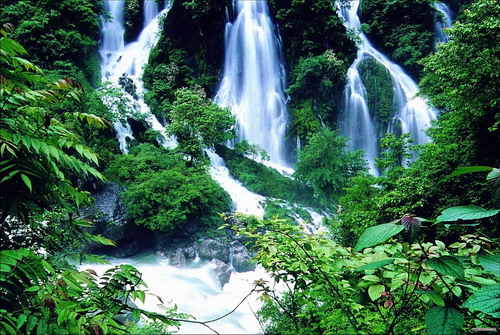 |
| Shennongjia is a treasure trove of wildlife and plant. |
In several mountain ranges from all over the world there are stories of hairy wild men roaming. Yeti in the Himalayas and Sasquatch on the US west coast are both members of this "wild men" family. Many people think that these are only stories and many sightings are probably nothing more than lies. But such stories have existed since the Middle Ages in Europe and Asia. Carvings of such creatures exist on some cathedrals. It's quite surprising to consider that people in very distant places believed the same thing.
So whether the story is in the human mind or a reality is hard to tell. Have you ever had an interest in it since your childhood? If you come to Shennongjia, you will not to be disappointed, even if you didn't see the wild men.
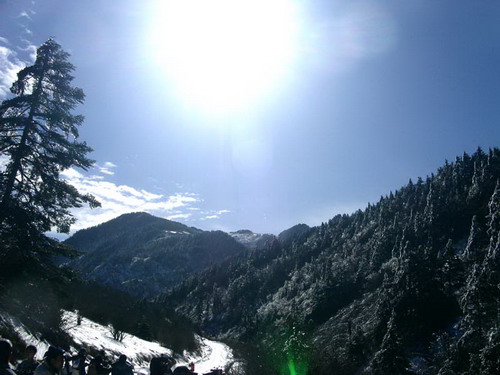 |
|
Shennongjia is probably one of very few virgin temperate forests remaining in the world. |
Treasures of wildlife
Shennongjia is situated in the west of Hubei province, not far from the entrance to the Three Gorges. It's part of a number of mountain ranges that close to the Sichuan Basin on its eastern side. Shennongjia is the higher point at about 3,000 meters in elevation.
All the mountains are karstic, a kind of lime that turns into a gigantic spongelike form with cavities that range from the size of your finger to those of caves. For those who are familiar with Swiss cheese, karst formations will be quite familiar.
In many places, it's very hard to walk because such rocks are interlaced with dense scrub and bamboo. Many mountain ranges all over the world have such geology.
When you visit them you can understand that animals of every size can hide easily in such places. Humans have difficulty penetrating a dense forest growing on karst. So Shennongjia is probably one of very few virgin temperate forests remaining in the world. Animals can hide easily in such places and many are recorded, such as the takin, a kind of big mountain goat, the golden monkey and the leopard.
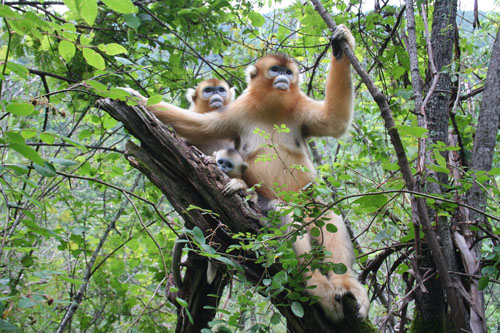 |
| The golden monkey in Shennongjia Natural Reserve |
Many botanist enjoyed seeing many interesting and beautiful alpine plants there, including a blue poppy that I thought only grew in the Himalayas. Pandas do not live here, but the bamboo on which they feed covers acres and acres of the mountain tops.
Not always, however. In fact, when you visited the place, such fields were covered with dead grey canes and only a few tender green shoots. Every five years this type of bamboo blooms and dies. It's the natural life cycle. This is one reason the pandas, that mostly feed on this plant, are sometimes starving. The grey shade of the dead bamboo, the karstic rocks and the alpine meadows covered with flowers give Shennongjia an unforgettable landscape. In fact, the place is like a sample of the mountains in the western part of China, for instance Sichuan.
Walking in the virgin forests is also an incredible experience for Nature lovers. Dead trees are left where they fell. The humus layer is very thick and you can observe a wide range of interesting plants. Many of them were introduced into Western gardens at the turn of the 19th century. Explorers and adventurers like Father David, Kingdom-Ward or Farrer sent seeds of such plants that still thrive in European gardens. Roses, Philadelphus, Cotoneasters, only to name a few, grow wild here. Such great biodiversity allowed the Shennongjia Natural Reserve to be part of the UNESCO MAB - Man and the Biosphere - network of Natural Parks.
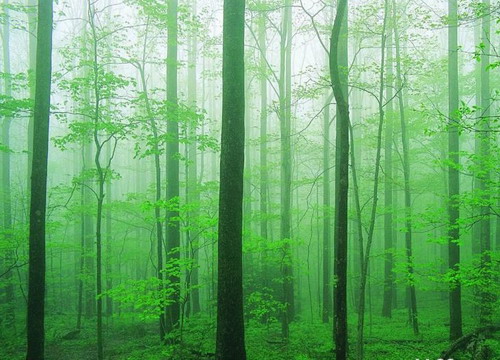 |
|
Walking in the virgin forests is an incredible experience for Natural lovers. |
What about the Yeren? A small exhibition tells of sightings. Unfortunately the texts are only in Chinese but the naive paintings on glasses that illustrate them increase the strangeness of the stories. Soldiers and peasants are depicted watching hairy creatures appearing in the forest or among the rocks. Obviously, nobody exactly see any Yeren, and whether they exist or not, nobody can tell. The only thing you may certain about is that Shennongjia forest protects its inhabitants - perhaps wild men among them. you could understand that in such a strange place strange encounters in the forest can be turned into legends.
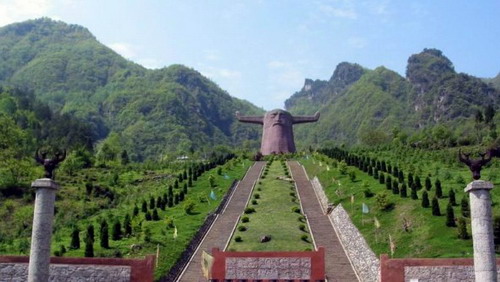 |
| The Shennong Altar |
Travel Tips
Reaching Shennongjia is not easy. If you come from Yichang, in Hubei province, you have to pass through Muyuping, a small village about 150 kilometres away in the mountains. You can take a small bus that will eventually lead you there. The road is beautiful, in a deep valley with high cliffs. If you're prone to bus-sickness, you'd better find another destination. Muyuping is a small mountain resort a few kilometres away from the gate of the park. The city lives from tourism. From Muyuping you can reach the Three Gorges Dam quite easily, taking a boat from Xingshan. So Shennongjia can also be a step in a journey from the centre to the west of China. Only a small part of Shennongjia can be visited. Two roads have been opened to the public.
From Wuhan to Yichang you can take a bus. The journey lasts about half a day and costs 90 yuan (US$11).
From Yichang to Muyuping, you can take a mini-bus also known as the "bread-bus" in China, for about half a day and 70 yuan (US$8.60).From Muyuping to Sandouping - the site of the Three Gorges Dam - you can take a minibus to Xingshan for about 20 yuan (US$2.50) and then a boat to Sandouping. Beware that there is no bank in Muyuping, so it's better to bring plenty of cash. Entrance to the park costs 120 yuan (US$15), the ticket being valid for only one day.You can rent a car with a driver in Muyuping.
